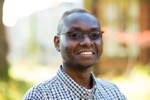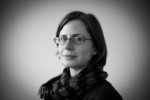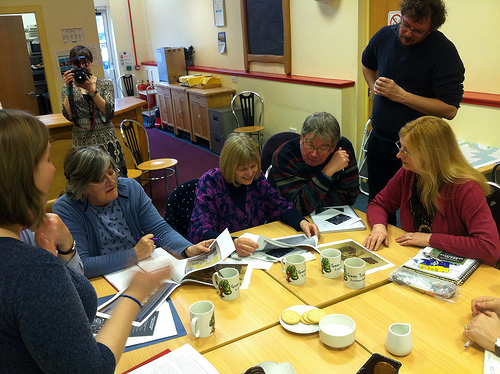Pararchive: Open Access Community Storytelling and the Digital Archive
This new project aims to co-produce a new open ‘access’ digital resource that facilitates engagement with, and use of, public archival material online. Daniel H. Mutibwa and Fiona Philip help join the dots.
About the authors:
 Daniel H. Mutibwa is Research Fellow in the School of Media and Communication (SMC), University of Leeds. He has researched and taught in SMC since 2008 on a wide number of topics including emerging innovative business models and growth aspirations of creative SMEs/microbusinesses in the media and creative/cultural industries, the relationship between creative/cultural industries and the physical environment, co-production research in a range of realms and third sector research, particularly social enterprise and social innovation.
Daniel H. Mutibwa is Research Fellow in the School of Media and Communication (SMC), University of Leeds. He has researched and taught in SMC since 2008 on a wide number of topics including emerging innovative business models and growth aspirations of creative SMEs/microbusinesses in the media and creative/cultural industries, the relationship between creative/cultural industries and the physical environment, co-production research in a range of realms and third sector research, particularly social enterprise and social innovation.
 Fiona Philip is Research Fellow on the Pararchive Project, and is based at the School of Media and Communication, University of Leeds. Having also worked as the RA on the ECRC-funded Communicating Copyright project, Fiona is interested in the copyright-related dilemmas and opportunities of Pararchive. Alongside issues of ownership and participation in the digital age, her research also considers the interwar literary and cinematic output of the neglected British modernist impresario and writer, Bryher, and the avant-garde film group, POOL. She is co-editor of the 2012 Special Issue: Austere Cultures/ Cultures of Austerity, Journal of European Popular Culture 3(1), and is currently collaborating (with Lee Edwards) on the Communicating Feminism project with Rape Crisis England & Wales.
Fiona Philip is Research Fellow on the Pararchive Project, and is based at the School of Media and Communication, University of Leeds. Having also worked as the RA on the ECRC-funded Communicating Copyright project, Fiona is interested in the copyright-related dilemmas and opportunities of Pararchive. Alongside issues of ownership and participation in the digital age, her research also considers the interwar literary and cinematic output of the neglected British modernist impresario and writer, Bryher, and the avant-garde film group, POOL. She is co-editor of the 2012 Special Issue: Austere Cultures/ Cultures of Austerity, Journal of European Popular Culture 3(1), and is currently collaborating (with Lee Edwards) on the Communicating Feminism project with Rape Crisis England & Wales.
Context of the project
Funded under the AHRC Digital Transformations in Community Research Co-Production in the Arts and Humanities and led by Simon Popple (University of Leeds), Pararchive (http://pararchive.com/) aims to co-produce a new open ‘access’ digital resource that facilitates engagement with and use of public archival material online. It will allow anyone to search and collect online sources and to combine them with their own media (film, photographs and other ephemera) in order to tell their own stories, make new archives, be creative, start new projects and do their own research. Pararchive will, for example, allow communities to research and document their histories via the creative linking of their own digital content with archival material from Pararchive’s institutional partners – the BBC and the Science Museum Group.
Pararchive started in October 2013 and is divided into four phases. The first identified user needs, research story interests and functionality of the digital resource through running technology lab workshops with four distinct community groups. In Phase Two an early interactive prototype of the resource was constructed based on the specifications developed in Phase One while in the third and ongoing phase, the beta version of the digital resource and other tools will be tested by our four community groups for suitability. A process of evaluating the experiences of our community group members, institutional partners and the technology team will follow in Phase Four, culminating in the production and launch of the open ‘access’ digital resource at our Community Showcase and Conference entitled Connecting Communities: Storytelling and the Digital Archive (http://bit.ly/1s4CNO3) on Friday 27 and Saturday 28 March 2015 at the University of Leeds.

Identifying Research Story Interests in a Technology Lab Workshop, Bute
Background of the project
The idea for Pararchive comes from two previous projects (The Open Archive Project and Fusion) that – in partnership with the BBC – investigated how people can connect with and make use of digital archival resources. The two projects explored how communities might take ownership of cultural and historical materials in which they are represented, and how they could use archival sources to give voice to their own stories and construct their own histories. The research resulted in the joint creation of a series of films entitled Strike Stories. A subsequent Creative Technology Lab in 2012 (http://bit.ly/1u0z6Ft) built upon this research by exploring how these community stories and histories as well as aspirations and ideas could be turned into a real resource open to anyone. An online resource named Pararchive was modelled and funding for it secured. Previous research has shown the need to work collaboratively to co-create this new resource.
 Learning on Screen
Learning on Screen